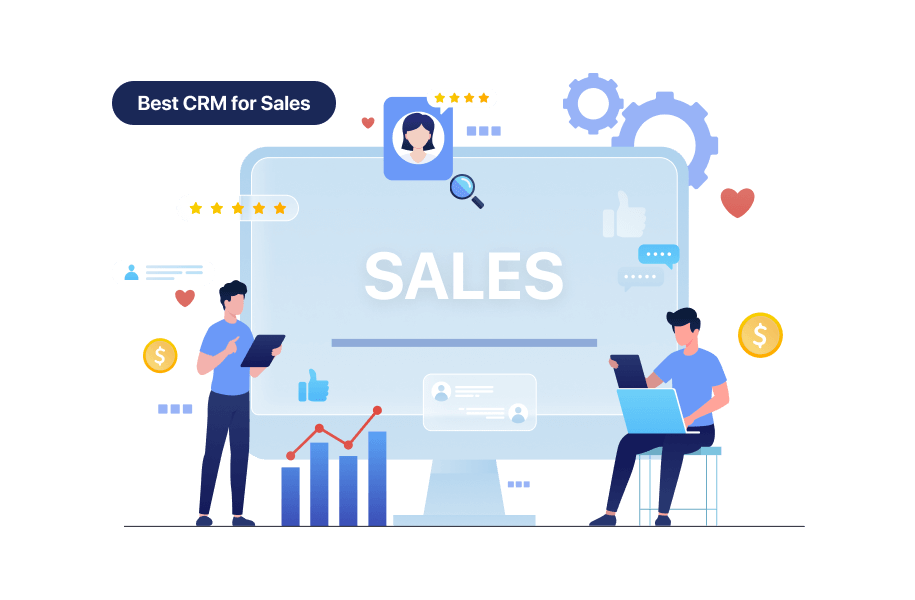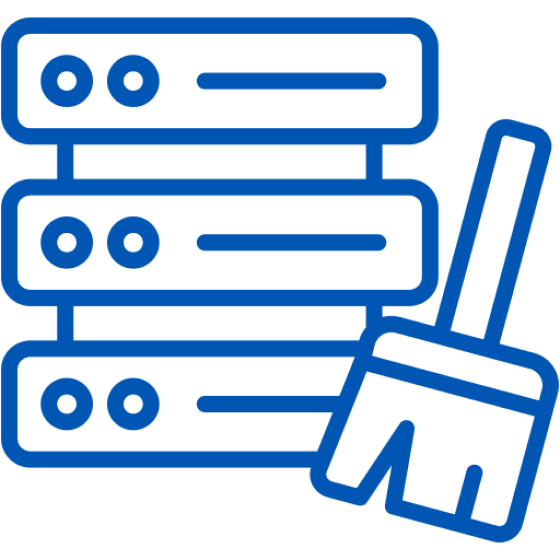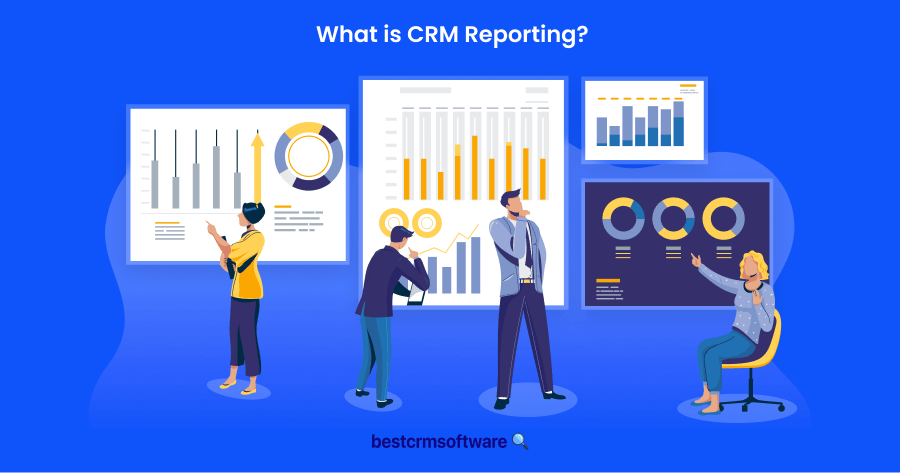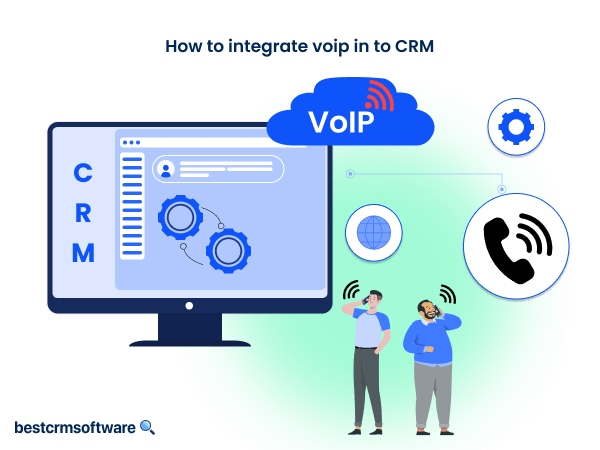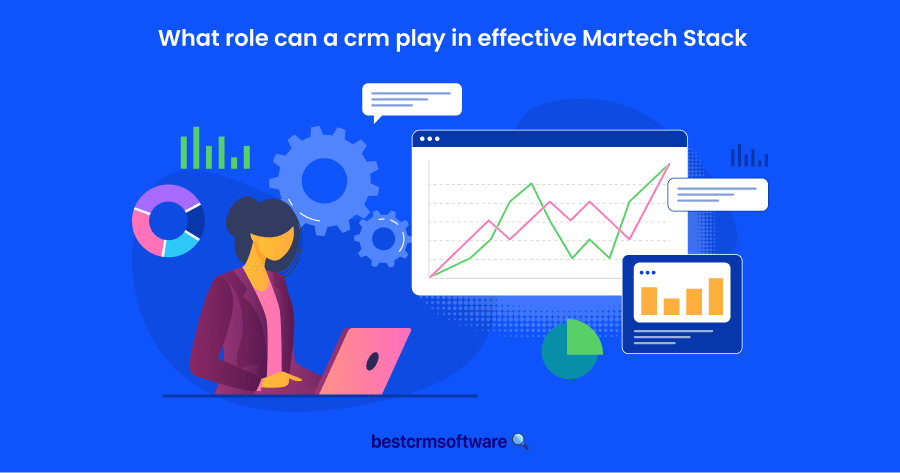
Best CRM Software for Sales
In a Nutshell
My study helped me to understand the different options out there and choose the ones that would work best for our team, so it should be a great help to you too.
Top 7 CRMs for Sales Teams in 2024
Later, you’ll be able to read my reviews of all ten CRMs that I went hands-on with. However, my shortlist below are my favorites to meet my company’s requirements.
In reality, depending on your requirements, any one of the ten CRMs we’ll review here may also be a great fit.
- Salesforce — Best for customer insight
- HubSpot — Best for integration options
- Zoho — Best for customization options
- Monday.com — Best for streamlining
- Pipedrive — Best for simplicity
- Freshsales — Best for analytics & reporting
- SugarCRM — Best combination of features
- Insightly — Best for seamless integrations
- Zendesk — Best for sales teams
- Nimble — Best for social first approach
Exploring CRM options can be tricky, especially when you need to find the ideal fit for your sales team. The market is full of options, and it’s time-consuming to sift through them to find the one that aligns with your team’s goals and workflow. I’ve done that work for you, so read on.
Why Sales Teams Need CRM Software
Sales teams rely on CRMs as crucial tools to streamline their operations and drive success. It improves customer engagement and helps to tailor sales pitches accordingly. Without a CRM, sales teams may struggle to track key details about their leads and customers, leading to missed opportunities and inefficient sales processes.
A CRM enables sales teams to optimize their workflows and maximize efficiency. Each one automates repetitive tasks such as data entry, lead nurturing, and follow-up emails, freeing up valuable time for more beneficial activities.
A great CRM also provides valuable insights and analytics that enable sales teams to make informed decisions and refine their strategies. This data-driven approach allows sales teams to:
- Prioritize leads
- Personalize their outreach efforts
- Optimize their sales processes for maximum effectiveness
Without a CRM, sales teams may find it difficult to get useful information from their data. This in turn would make it harder for them to change and flourish in today’s competitive market.
Criteria for Selecting the Best CRM for Sales
Selecting the best CRM software for sales requires careful consideration of several key criteria:
1. Ease of use
A CRM that’s intuitive and user-friendly, is easy for sales reps and other staff to become confident using without too much training.
2. Customization
The ideal CRM should offer robust customization options to tailor the platform to your specific business needs and sales processes.
3. Integration
Choose a CRM that seamlessly integrates with your existing tools and systems, such as email, calendar, and marketing automation software to ensure smooth data flow between different platforms, reducing manual data entry and improving overall efficiency.
4. Mobile accessibility
In today’s mobile-driven world, it’s essential to choose a CRM that offers mobile accessibility. Look for a platform with dedicated mobile apps or an adaptive website that allows sales representatives to stay efficient on the go.
5. Scalability
Look for a platform that can accommodate increasing data volumes, user numbers, and feature requirements as your sales team grows.
6. Analytics & reporting
A robust CRM should offer advanced analytics and reporting capabilities to help sales teams track performance, identify trends, and make data-driven decisions. Look for features such as customizable dashboards, real-time reporting, and predictive analytics to gain valuable insights into your sales operations.
7. Customer support
It’s essential to consider the quality of the customer support and training the CRM provider offers. Look for a vendor that provides responsive customer support, comprehensive training resources, and ongoing assistance to ensure a smooth implementation and continued success with the software.
Top 10 CRMs for Sales Teams
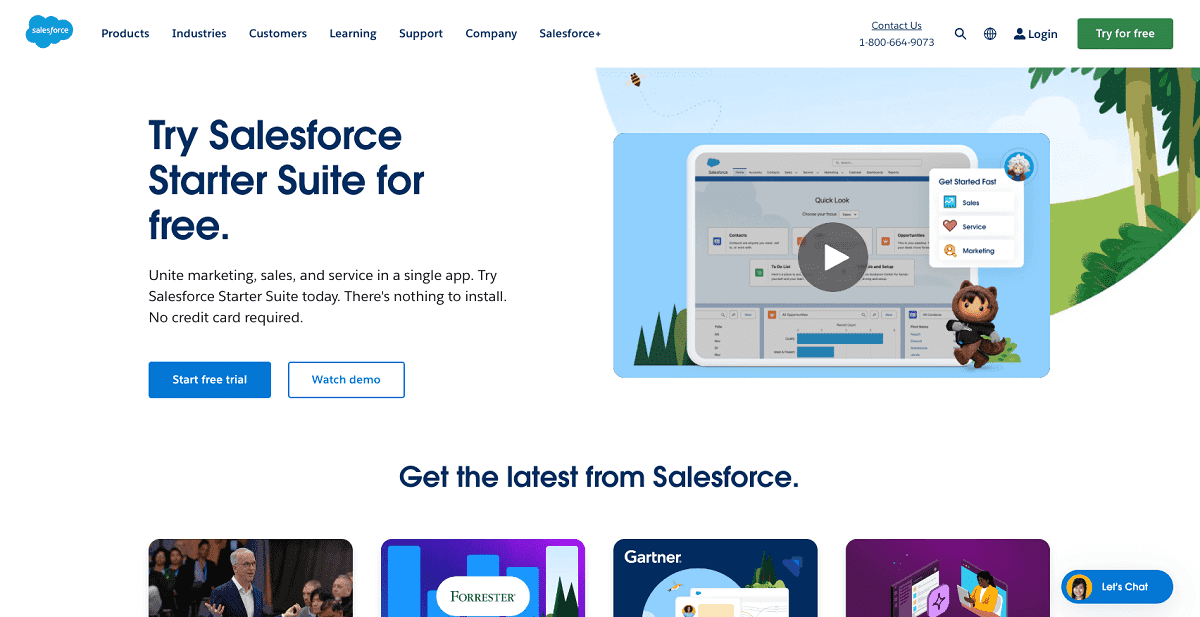
Why we like it
Salesforce CRM stands out for its comprehensive suite of features designed specifically to meet the needs of sales teams and its easy-to-use interface. It also has strong customization options and seamless integration. These factors make it a top choice for businesses of all sizes.
Salesforce is committed to innovation, ensuring that users have access to cutting-edge tools and tech. These are essential to staying ahead in today’s competitive marketplace.
From lead management to forecasting, it’s got it all. Its AI-driven insights help sales teams accurately predict customer needs.
Key Sales Features
- Lead management
Powerful lead management capabilities allow sales teams to capture, track, and nurture leads. Its lead scoring feature helps prioritize leads based on the likelihood of converting them to sales, allowing sales reps to focus on high-potential opportunities
- Opportunity management
Sales teams can easily manage their pipeline and track opportunities. They can also customize sales stages. Real-time updates ensure that sales reps can see their deals and act to move them forward
- Sales forecasting
Provides valuable insights into future revenue projections, enabling sales managers to make informed decisions and allocate resources effectively. The models are customizable and have advanced analytics. Sales teams can use them to predict sales and find areas to improve.
- Workflow automation
Sales teams can automate repetitive tasks, streamline processes, and improve productivity. Salesforce offers automated email follow-ups as well as task assignments and approval workflows. These tools help sales reps stay organized and focused on what matters most: closing deals.
Pros
- Invaluable customer insights
- Intuitive user interface
- Great customization options
Cons
- Steep learning curve for new users
- More expensive than some competitors

Why we like it
HubSpot seamlessly integrates sales and marketing. It’s a full solution for businesses that want to align sales with their marketing. The platform benefits from a user-friendly interface and intuitive design, making it easy for sales teams to navigate and use its great features well.
Its seamless integration with marketing automation makes it easy to align sales and marketing efforts. Plus, its user-friendly interface simplifies the whole process
Additionally, HubSpot is committed to continuous improvement and innovation. This commitment ensures that users have access to cutting-edge tools and updates. These are of paramount importance to stay ahead in the ever-changing sales landscape.
Key Sales Features
- Contact Management
Sales teams can store and organize contact information and manage communication effectively. The database is centralized and ensures that sales reps have a complete view of each prospect or customer wherever they are. It also makes it a great deal easier for reps to build a rapport with their prospects with more personalized engagement and follow-up, creating sales opportunities.
- Pipeline Management
With HubSpot CRM, sales teams can easily create and customize sales pipelines to visualize their sales processes, track deal progress, and prioritize activities. The platform provides real-time insights into the sales pipeline, enabling sales managers to identify bottlenecks, forecast revenue, and optimize performance.
This visibility enables company leaders to make the best possible strategic decisions on the company’s direction.
- Email Tracking and Sequences
HubSpot CRM includes email tracking and sequencing features, empowering sales representatives to send personalized emails, track engagement metrics, and automate follow-up sequences.
This functionality helps sales teams stay organized, nurture leads effectively, and close deals faster by ensuring timely and targeted communication.
- Reporting and Analytics
Sales teams can track key performance metrics and gain insights into sales processes. The platform provides customizable dashboards and real-time reports. Its advanced analytics tools help sales teams make data-driven decisions and improve performance.
Pros
- Plenty of integration options
- Easy to navigate
- Free version available
- Lots of training materials
Cons
- Limited customization options
- Limited integration

Why we like it
Zoho CRM stands out for its many features. It has a user-friendly interface and robust customization options. This makes it a great choice for sales teams of all sizes.
Its seamless integration with other Zoho applications and third-party tools ensures a seamless user experience and enhanced productivity. Additionally, Zoho is committed to affordability. Its flexible pricing plans make it accessible to businesses with varying budgets.
Zoho feels like a hidden gem. It may not have the same brand recognition as Salesforce, but don’t let that fool you. It packs a punch with its customization options and robust analytics.
Key Sales Features
- Lead management
Sales teams can capture, nurture, and convert leads. Zoho CRM has lead scoring and assignment rules. It also has automated follow-ups. These features streamline lead management. They ensure no opportunity falls through the cracks.
- Pipeline management
Sales teams can visualize their sales pipeline and track deals at every stage. They can also forecast revenue accurately. Customizable pipeline views and real-time updates empower sales reps to prioritize tasks.
- Contact management
Zoho CRM centralizes customer data. It provides a 360-degree view of each contact’s interactions, preferences, and history. Sales teams can easily split contacts. They can track communication history. They can personalize interactions. This builds stronger relationships and drives repeat business.
Pros
- Intuitive navigation
- Integrates well with other Zoho products
- Good range of price plans
- Great mobile app
Cons
- Limited support on free plan
- Some integration & reporting features complicated to set up

Why we like it
Monday CRM stands out for its intuitive user interface and extensive customization options. Its visually appealing and user-friendly design ensures quick adoption by sales representatives and other staff.
It minimizes training time and maximizes productivity. Additionally, Monday CRM has strong project management features. Sales teams are able to work together on deals and track progress in real-time.
It’s designed to streamline sales processes and enhance team collaboration. It also empowers sales teams to stay organized and focused on closing more deals. Monday has customizable workflows and integrates seamlessly with other business tools, making it a versatile solution for driving sales success.
Key Sales Features
- Customizable workflows
Monday CRM allows sales teams to create custom workflows. This way, teams can automate repetitive tasks, streamlining their workflows and saving time.
- Integration with communication tools
Integration with communication tools such as email, calendar, and messaging apps means that sales teams can have all customer communication and scheduling information within the platform.
Prospects like to communicate in a wide variety of ways, and while it’s essential to ‘meet them where they are’, it’s just as important to remain organized to avoid miscommunication and missed opportunities.
- Advanced reporting and analytics
Monday CRM offers robust reporting and analytics capabilities. When sales teams can gain valuable insights into their performance and customer behaviors, they can make effective data-driven decisions. This also helps in the long term, as it supports sales strategies for the company.
Pros
- Streamlines sales processes really well
- Extensive customization options
- Visual pipeline management
Cons
- Could be expensive for smaller budgets
- Few integration options

Why we like it
Its simple layout and visual pipeline management make it easy for users to navigate. Plus, users can tailor the platform to their specific sales processes and company objectives.
If simplicity is important to you, look no further than Pipedrive. Its intuitive interface is extremely refreshing in the sometimes cluttered world of CRM software. I appreciated its focus on pipeline management, keeping the sales process streamlined and efficient.
Key Sales Features
- Activity tracking
Sales representatives can log activities directly within the platform. All interactions with leads and customers are recorded, which means sales teams have valuable insights into sales performance and progress right at their fingertips.
- Email integration
Pipedrive seamlessly integrates with popular email platforms such as Gmail and Outlook, allowing users to send and receive emails directly within the CRM. This integration streamlines communication and ensures that all correspondence is centralized and easily accessible.
- Sales reporting
Users can track key sales metrics and gain valuable insights into sales performance. This helps sales teams to make informed decisions and optimize their strategies.
Pros
- Simple user interface
- Customizable pipeline stages & workflows
- Seamless email integration
- Solid reporting & analytics
Cons
- Slightly lacking in automation capabilities
- Pricing less accessible to a limited budget
- Technical expertise required for advanced customization
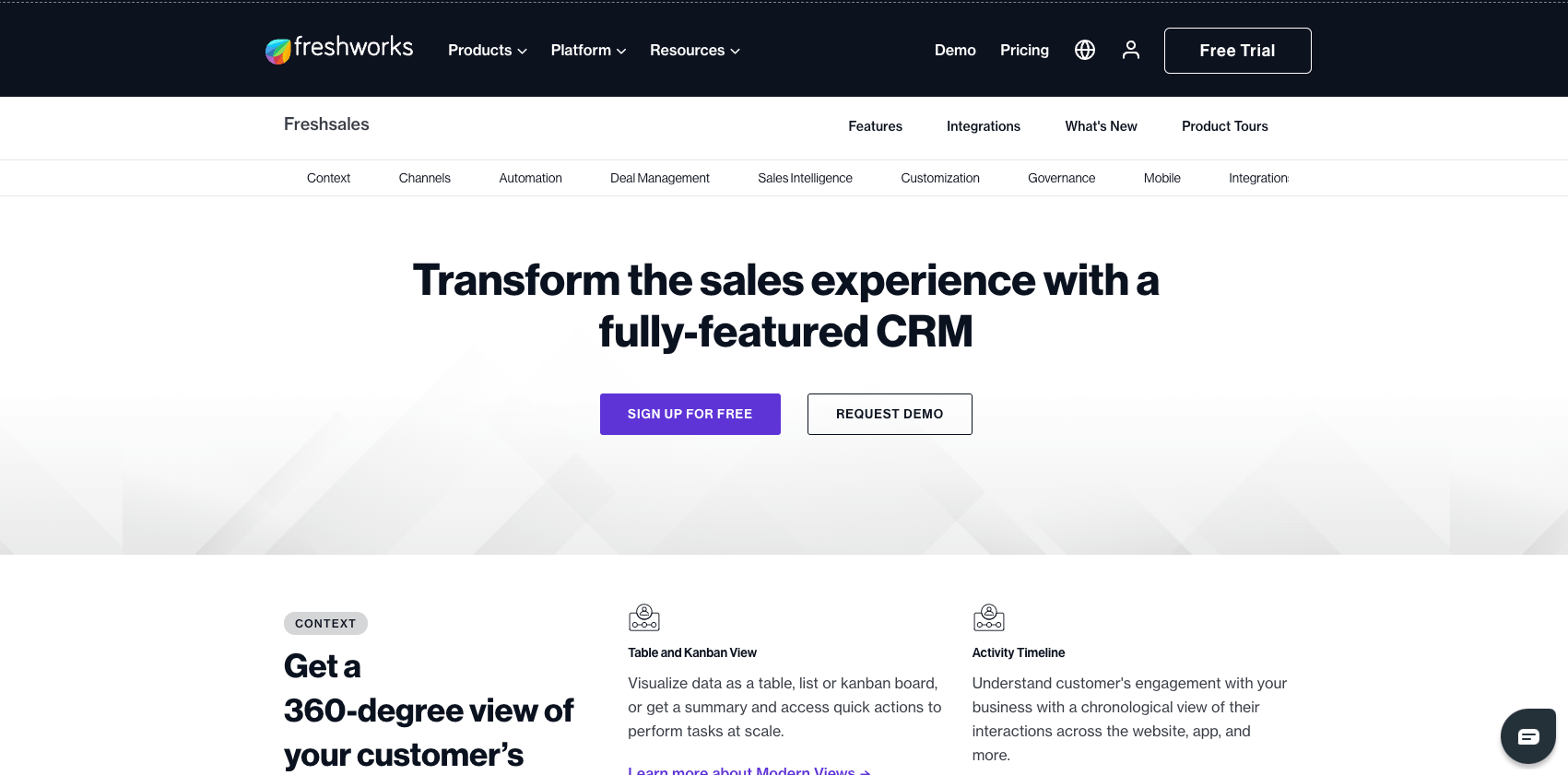
Why we like it
Freshsales CRM has an intuitive user interface and robust feature set. It’s an excellent choice for sales teams of all sizes. It integrates with email, phone, and other channels. This ensures that sales reps have all the tools they need. They can use them to engage with prospects and close deals.
Key sales features
- Lead management
Freshsales offers features including lead scoring, lead assignment, and automated lead nurturing workflows. Sales teams can easily track and prioritize leads based on their chances of converting, ensuring that they focus their efforts on the most promising opportunities.
- Pipeline management
The platform provides a visual pipeline view that allows sales teams to track the progress of deals at every level of the sales funnel. Customizable pipelines let businesses create many sales pipelines which they can tailor to different products, regions, or sales processes.
- Email and communication integration
Freshsales integrates seamlessly with email platforms such as Gmail and Outlook, enabling sales representatives to send and receive emails directly within the CRM. This integration ensures that all communication is centralized and easily accessible, eliminating the need to switch between multiple tools.
- Analytics and reporting
This offers valuable insights into sales performance, pipeline health, and individual rep productivity. Dashboards and reports are customizable and enable sales managers to track key metrics and identify trends. This data is invaluable to good decision making and improvement of sales strategies.
Pros
- Intuitive user experience
- Excellent integration with various communication channels
- Advanced reporting & analytics
Cons
- Limited 3rd-party integration
- Advanced customization can be quite challenging
- Pricing plans not the most economical

Why we like it
I was drawn to Sugar CRM for its great mix of features. It is easy to use and flexible. This makes it a standout choice for sales teams. Its easy-to-use interface and many features help users. They can manage customer relationships, drive sales growth, and reach their goals.
Additionally, Sugar CRM is committed to customization. It can adapt to the unique needs and workflows of any sales team. It provides a tailored solution that boosts productivity and efficiency.
Key sales features
- Comprehensive lead management
Sales teams can track and nurture leads through every sales funnel stage. It has features like lead scoring, assignment rules, and lead routing so sales reps are able to focus on the best opportunities.
- Opportunity management features
This enables sales teams to manage and track sales opportunities. They do this from initial contact to close. Users can create custom opportunity records as well as track sales stages and forecast revenue.
- Pipeline tools
The pipeline tools enable sales teams to see and manage their sales pipelines easily with customizable views. There’s drag-and-drop functionality and real-time updates. Sales reps can use them to see their pipeline health to ensure that they’re going in the right direction with their sales strategies. Reps are also able to make faster, informed decisions to speed up deals to accelerate the sales process.
- Integration capabilities
Sugar integrates with many third-party applications and business systems. These include email, marketing automation, and ERP software. This integration ensures that sales teams can access all needed data in one place. It removes silos and streamlines workflows.
Pros
- User-friendly interface
- Extensive customization options
- Excellent customer support
Cons
- Advanced customization can get complicated
- Disappointing mobile app
- Higher-end pricing

Why we like it
Insightly CRM stands out for its seamless integration of project management and CRM functionalities. It’s an ideal choice for sales teams that need to manage both customer relationships and projects on one platform.
Its simple interface and customizable workflows make sure sales reps can easily use the software. They can also tailor it to fit their needs. Additionally, Insightly has strong reporting and analytics. They help teams make informed decisions to drive growth.
Key sales features
- Lead and contact management
Insightly offers comprehensive lead and contact management tools, allowing sales teams to capture, track, and nurture leads throughout the sales pipeline.
- Pipeline management
Sales reps can visualize and track deals at every stage of the sales process. They can prioritize opportunities and focus their efforts on closing deals.
- Email integration
The feature allows sales representatives to manage communications within the CRM. This ensures that all customer interactions are centralized and accessible.
- Reporting and analytics
Sales teams can analyze sales performance and track key metrics. Customizable dashboards provide real-time insights into pipeline health and sales trends.
Pros
- Seamless integration of project management & CRM functionalities
- Comprehensive lead and contact management tools
- Email integration with popular platforms
Cons
- Limited customization options
- Towards the more expensive end of the market
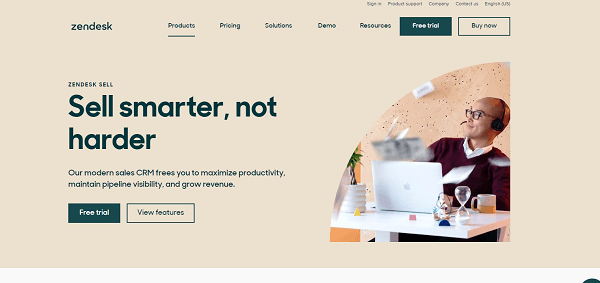
Why we like it
I was drawn to Zendesk Sell for its comprehensive suite of features tailored to the needs of sales teams. One standout aspect is its intuitive user interface. It makes navigation a breeze and ensures quick adoption by sales representatives.
Customization options allow users to tailor the platform to their processes and preferences. The platform offers integration capabilities and mobile accessibility. This way, sales teams can stay productive and responsive, whether in the office or on the go.
Key sales features
- Unified platform
A centralized hub for managing customer interactions across multiple channels enables sales teams to see the full history of customer communication. It helps them give personalized experiences and build strong relationships.
- Lead and contact management
Sales teams can capture, track, and prioritize leads and contacts. The platform offers robust lead scoring capabilities so sales reps can focus on big opportunities.
- Sales pipeline management
Zendesk Sell offers powerful tools for managing the sales pipeline. These include customizable pipelines, deal tracking, and forecasting. Sales teams can easily see their pipeline. They can track deal progress and find bottlenecks or places to improve.
- Automation and workflow
Zendesk Sell streamlines sales processes through automation. It also has features such as email sequencing, task reminders, and workflow automation.
- Analytics and reporting
Zendesk Sell allows sales teams to track performance, identify trends, and make data-driven decisions. It operates with customizable dashboards and real-time reporting.
Pros
- Easy navigation & quick adoption
- Great mobile working
- Comprehensive lead & contact management
Cons
- Small firms may find it expensive
- Steep learning curve for some features
- Limited marketing automation

Why we like it
Nimble has an intuitive user interface and robust feature set. It also stands out for its social-first approach. Additionally, its unified inbox feature consolidates communications from various channels. This way, sales representatives can stay organized and responsive in their outreach efforts.
Most important sales features:
- Contact management
Nimble offers comprehensive contact management capabilities. This allows sales teams to store and organize customer information in a centralized database. This includes details such as contact information, communication history, and social media interactions.
- Unified inbox
Sales representatives can manage all their communications in one centralized location. This makes communication faster. It ensures that they miss no leads or opportunities.
- Pipeline Management
Nimble CRM offers robust pipeline management tools. These tools allow sales teams to track the progress of deals from lead to close. Customizable pipelines let sales reps see their sales process. They can then prioritize tasks accordingly. ensuring a steady flow of revenue.
Pros
- Seamless integration with social media
- Unified inbox feature
- Customizable pipelines
Cons
- Limited advanced reporting
- Steep learning curve for less tech-literate users
- Could be expensive for smaller companies
Considerations for Small vs. Large Companies
When it comes to CRM software, the needs of small and large-scale enterprises can vary significantly. Here’s how the unique requirements of each type of company are addressed:
Small Companies
For startups and small businesses these are key considerations when choosing a CRM solution:
- scalability,
- customization options, and
- affordability.
Small companies need a CRM platform that can grow with them as they expand their operations. Scalability is crucial. The best sales CRM for small businesses must handle growing data volumes. It must do so without adding much cost or disrupting workflows.
When choosing the best CRM for a small sales team, customization options are vital. They use them to tailor the CRM platform to their unique business needs and sales processes. This flexibility allows them to adapt the software. They can make it reflect their unique needs, workflows, and industry-specific details. Additionally, affordability is a primary concern for small companies with limited budgets. They need a CRM solution that offers robust features at a competitive price.
Large Companies
CRM software is needed by large businesses. It needs to have advanced features for enterprise-level scalability, flexibility, and use. These features help them handle their complicated processes and large user base. Scalability is especially important for large businesses. They have to deal with a lot of info from their many customers and lots of sales. They need a CRM platform that can handle a lot of users and big projects.
Big businesses also need customization options. Such options help make the CRM fit their unique processes. They might also need advanced tools to customize the CRM software. With these tools, they would automate complex tasks and to ensure that it follows data rules.
Both small and large companies require CRM software to drive sales growth. Yet, their unique needs must be taken into account when selecting a CRM solution.
Unlocking Sales Excellence: Finding Your Perfect Fit with the Best Sales CRM Software
In conclusion, the choice of CRM software is a critical decision for businesses of all sizes. You might be a small startup. You’re looking for scalability, customization, and affordability.
If you’re a larger enterprise, you need advanced scalability, customization, and enterprise-level features. Picking the right CRM solution is crucial. It will drive sales growth and maximize customer relationships.
Businesses can identify a CRM platform that meets their needs. They can do this by considering factors. These include scalability, customization, affordability, and enterprise features. The right CRM software empowers sales teams. It helps them to streamline processes, boost productivity, and deliver great customer experiences. This drives success and competitiveness in today’s dynamic business world.

